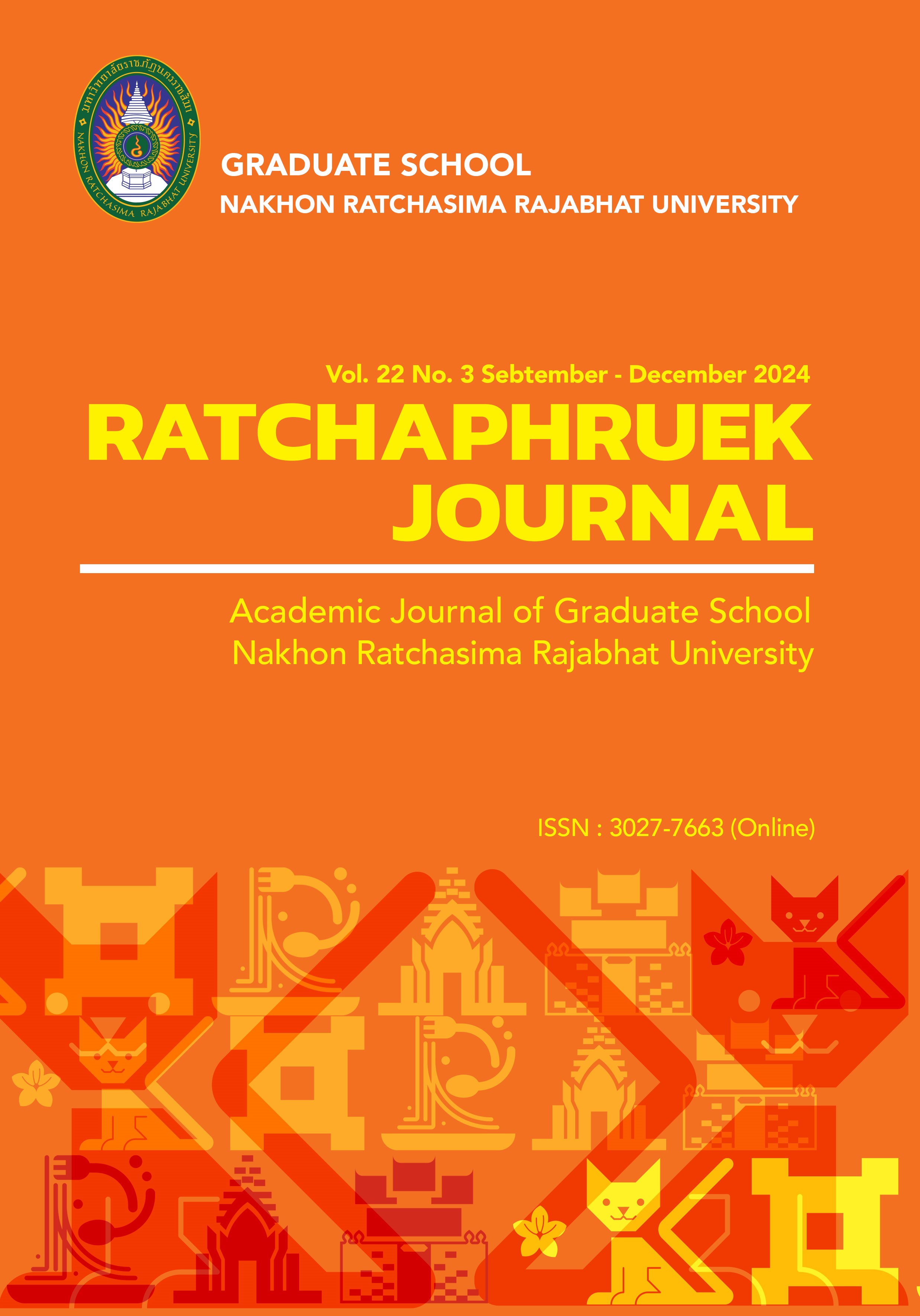Learning Outcomes of Competency-Based Instruction Using the Concept of Community-Based Learning for Development of Learning Achievement and the Self-Management Competency of Grade 3 Students
Main Article Content
Abstract
The objective of this study was to 1) compare the achievement of competency-based learning management using the community-based concept before and after learning and learning achievement with the 70 percent criterion 2) compare the self-management competency before and after learning, and 3) Study the learning conditions using competency-based learning management using the community-based concept. The sample was grade 3 students at Tanoenratwittayakan School, Noen Sanga District, Chaiyaphum Province. Semester 2, Academic Year 2022 was obtained by cluster random sampling. The statistics used are mean, percentage, standard deviation. t-test and Wilcoxon test.
The results showed that 1) achievement was statistically significantly higher than before and after was 70 percent higher at the .05 level. 2) Self-management Competency was statistically significantly higher than before, at a level of .05, and 3) the results of a community-based competency-based learning management study. It was found that students were happy and excited because the subject they learned was related to the contextual environment in the community, which is a real-life context that students are familiar with. Interested in learning to expand thinking Plan, improve.
Article Details

This work is licensed under a Creative Commons Attribution-NonCommercial-NoDerivatives 4.0 International License.
References
กิติพงษ์ ลือนาม. (2564). วิธีวิทยาการวิจัยทางการศึกษา. นครราชสีมา: โคราชมาร์เก็ตติ้ง แอนด์ โปรดักชั่น.
นิภาพรรณ เจนสันติกุล. (2564). กระบวนการเรียนรู้โดยใช้ชุมชนเป็นฐาน: บทสะท้อนจากประสบการณ์ และการเรียนรู้. วารสารมนุษยศาสตร์และสังคมศาสตร์ มมร. วิทยาเขต อีสาน, 2(3), น. 78-85.
บุญชม ศรีสะอาด. (2556). การวิจัยเบื้องต้น. กรุงเทพฯ: สุวีริยาสาสน์.
โรงเรียนตาเนินราษฎร์วิทยาคาร. (2564). หลักสูตรสถานศึกษา. ชัยภูมิ: สำนักงานเขตพื้นที่การศึกษาประถมศึกษาชัยภูมิ เขต 3.
สิรินทร์นิชา ปัญจอริยะกุล. (2563). การวัดผลและประเมินผลการศึกษา. เชียงใหม่: อินฟอร์เมชั่นเทคโนโลยี.
สุนันท์ สีพาย. (2564). การพัฒนาเครื่องมือรวบรวมข้อมูลการวิจัยทางการศึกษา. ชัยภูมิ: คณะครุศาสตร์มหาวิทยาลัยราชภัฏชัยภูมิ.
สมบูรณ์ ตันยะ. (2554). วิธีวิทยาการวิจัยทางการศึกษา. นครราชสีมา: คณะครุศาสตร์ มหาวิทยาลัยราชภัฏนครราชสีมา.
สำนักงานคณะกรรมการการศึกษาขั้นพื้นฐาน. (2560). ตัวชี้วัดและสาระการเรียนรู้คณิตศาสตร์. กรุงเทพฯ: โรงพิมพ์ชุมนุมสหกรณ์การเกษตรแห่งประเทศไทย.
สำนักงานคณะกรรมการการศึกษาขั้นพื้นฐาน. (2564). หลักสูตรการศึกษาขั้นพื้นฐาน (หลักสูตรฐานสมรรถนะ). สืบค้นเมื่อ 12 ตุลาคม 2565, จาก https://cbethailand.com
สำนักงานเลขาธิการสภาการศึกษา. (2563). การจัดการเรียนรู้ฐานสมรรถนะเชิงรุก. นนทบุรี: เซนจูรี่.
สิรินาถ จงกลกลาง. (2562). วิทยาการการจัดการเรียนรู้. นครราชสีมา: คณะครุศาสตร์ มหาวิทยาลัยราชภัฏนครราชสีมา.
อนุศร หงส์ขุนทด. (2563). หลักสูตรฐานสมรรถนะ. สืบค้นเมื่อ 12 ตุลาคม 2565, จาก http:// krukob.com/web/1-159/
Egodawatte, G. (2014). An analysis of the competency-based secondary mathematics curriculum in Sri Lanka. Educational Research for Policy and Practice, 3(1), pp. 45-63. Retrieved October 12, 2022, from https://doi.org/10.1007/s10671-013-9145-5
Tyler, E., Aaron, M. & Brandy, R. (2022). Self-management interventions for reducing challenging behaviors among school-age students: A systematic review. Campbell Systematic Reviews, 18(10), pp. 1-44. Retrieved October 12, 2022, from https://doi.org/10.1002/cl2.1223


